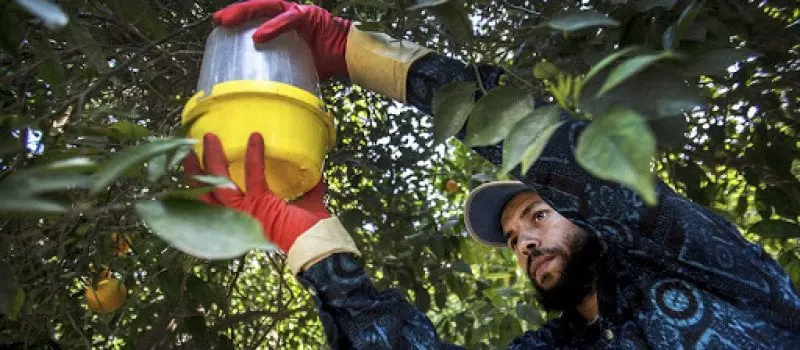‘Tools for sustainable agriculture of the future’: Biopesticides will be able to control pests, diseases, and weeds — and make crops more resistant to climate change
‘Tools for sustainable agriculture of the future’: Biopesticides will be able to control pests, diseases, and weeds — and make crops more resistant to climate change


Biologicals are tools for the sustainable agriculture of the future… Biologicals are a class of agricultural products that include biopesticides, biofertilizers, and biostimulants that are derived from natural materials, such as animals, plants, bacteria, or minerals.
…
Biopesticides have many advantages over chemical pesticides. For farmers, biopesticides are attractive because they facilitate integrated pest management (IPM) and protect beneficial organisms, including pollinators.
They are also an important tool for resistance management, offer advantageous labor and harvest flexibility, and have very low toxicity. For consumers, biopesticides reduce the risk of residue issues, satisfy the public demand for a more favorable ecological footprint.
In light of the extensive benefits of biopesticides, why have these products not already surpassed chemical pesticides in market share? Despite recent progress, biopesticides face several major challenges, including lower efficacy and a lack of suitable application technologies.
…
[Everyone will] benefit from this revolution: Consumers will be assured that their food is grown safely and sustainably; farmers will have new tools for regenerative agriculture and a new income stream from sustainable services such as carbon sequestration as a means to combat climate change; and the industry will enjoy a large new market, which will guarantee a sustainable pipeline of future biologicals.Read the original post

 | Videos | More... |

Video: Nuclear energy will destroy us? Global warming is an existential threat? Chemicals are massacring bees? Donate to the Green Industrial Complex!
 | Bees & Pollinators | More... |

GLP podcast: Science journalism is a mess. Here’s how to fix it

Mosquito massacre: Can we safely tackle malaria with a CRISPR gene drive?

Are we facing an ‘Insect Apocalypse’ caused by ‘intensive, industrial’ farming and agricultural chemicals? The media say yes; Science says ‘no’
 | Infographics | More... |

Infographic: Global regulatory and health research agencies on whether glyphosate causes cancer
 | GMO FAQs | More... |

Why is there controversy over GMO foods but not GMO drugs?

How are GMOs labeled around the world?

How does genetic engineering differ from conventional breeding?
 | GLP Profiles | More... |

Alex Jones: Right-wing conspiracy theorist stokes fear of GMOs, pesticides to sell ‘health supplements’




 Trust issues: What happens when therapists use ChatGPT?
Trust issues: What happens when therapists use ChatGPT? Fighting deforestation with CO2: Biotechnology breakthrough creates sustainable palm oil alternative for cosmetics
Fighting deforestation with CO2: Biotechnology breakthrough creates sustainable palm oil alternative for cosmetics California, Washington, Oregon forge immunization alliance to safeguard vaccine access against federal undermining
California, Washington, Oregon forge immunization alliance to safeguard vaccine access against federal undermining Viewpoint — Fact checking MAHA mythmakers: How wellness influencers and RFK, Jr. undermine American science and health
Viewpoint — Fact checking MAHA mythmakers: How wellness influencers and RFK, Jr. undermine American science and health 30-year-old tomato line shows genetic resistance to devastating virus
30-year-old tomato line shows genetic resistance to devastating virus Viewpoint: Video — Big Solar is gobbling up productive agricultural land and hurting farmers yet providing little energy or sustainabilty gains
Viewpoint: Video — Big Solar is gobbling up productive agricultural land and hurting farmers yet providing little energy or sustainabilty gains The free-range chicken dilemma: Better for birds, but with substantial costs
The free-range chicken dilemma: Better for birds, but with substantial costs ‘You have to treat the brain first’: Rethinking chronic pain with Sanjay Gupta
‘You have to treat the brain first’: Rethinking chronic pain with Sanjay Gupta
